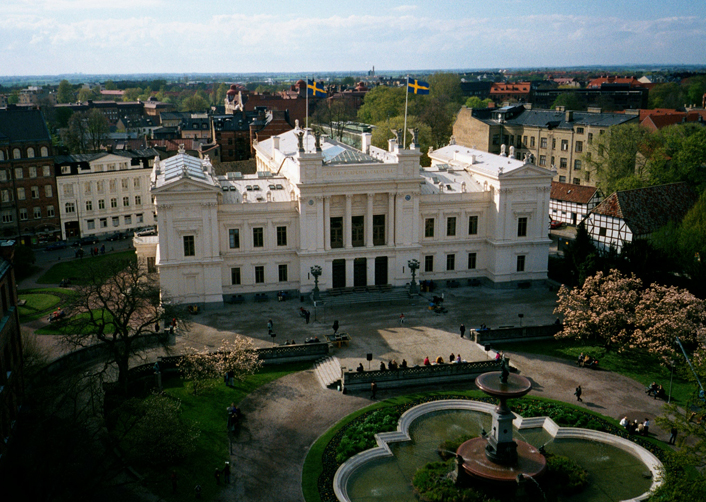Lund University was founded in 1666 and is repeatedly ranked among the world’s top 100 universities. The University has around 44 000 students and more than 8 000 staff based in Lund, Helsingborg and Malmö. We are united in our efforts to understand, explain and improve our world and the human condition.
Lund University welcomes applicants with diverse backgrounds and experiences. We regard gender equality and diversity as a strength and an asset.
Dr. Eran Elhaik led the compositional genomic analyses in over a dozen sequencing consortia, whose results were published in Science, Nature, PNAS, and Genome Research. Dr. Elhaik’s lab is famous for its population genomics and biogeographical research http://www.eranelhaiklab.org/ and collaborates with hundreds of researchers from all over the world.
Postdoctoral fellow in Bioinformatics: DNA sequencing and Identifying protective genes in plant
We are interested in developing an optimized system of using DNA and RNA NGS and mapping data to identify genes associated with how a crop plant responds to biotic treatment for biocontrol and biostimulation.
This is a multi-disciplinary project involving programming and modeling. In addition, the project will involve collaborations with researchers in other disciplines, including biomathematics, biostatistics, and molecular biology.
Work duties
The candidate will work jointly with Dr. Eran Elhaik, Prof. Allan Rasmusson, and Prof. Laura Grenville-Briggs Didymus (at the Swedish University of Agricultural Sciences (SLU), Alnarp), to sequence the genome of plants and apply functional genomic tools to the plant genomes.
The main duty involved in this position is to conduct research. Teaching may also be included, but up to no more than 15% of working hours. The position shall include the opportunity for three weeks of training in higher education teaching and learning.
• The successful candidate will work on the above-outlined research project. It is expected that she/he will apply and optimize tools to pursue the overall project goals and, after a training period, independently analyze plant genomic data.
• All work will be carried out embedded in a collaborative research team, requiring sharing of expertise, open discussion of results, and facilitating experiments of other team members.
• Active participation at international conferences is expected, as well as dissemination of results in peer-reviewed publications.
• Opportunities for supervision of degree projects (Bachelor and Master) as well as co-supervision of PhD projects may be provided.
• The successful candidate is encouraged to actively seek independent research funding during the employment period, providing the opportunity to transition towards an independent researcher position.
• Finally, the position may include limited duties in administration related to the work duties listed above.
Qualification requirements
Appointment to a post-doctoral position requires that the applicant has a PhD, or an international degree deemed equivalent to a PhD, within the subject of the position, completed no more than three years before the date of employment decision. Under special circumstances, the doctoral degree can have been completed earlier.
The candidate must have a degree in bioinformatics, biostatistics, statistical genetics, or a similar relevant subject and experience of conducting such research through a previous research assistant post or through working towards a Ph.D. Applicants must have the ability to collaborate well and communicate scientific materials to non-scientists.
Additional essential requirements:
- Very good oral and written proficiency in English.
- Strong programming skills in Python/R or a similar language.
- Experience in analyzing qualitative and quantitative NGS data.
- A track record of publishing peer-reviewed academic papers.
- Evidence of ability to work effectively both independently and as a member of a small team.
- Evidence of ability to organize resources, plan and progress work activities, and meet deadlines effectively and consistently.
- Experience in adapting own skills to new circumstances.
- The candidate is expected to have a strong grounding in programming in R and math/statistics as well as experience using bioinformatic tools for genome sequencing, assembling, and processing.
Assessment criteria and other qualifications
This is a career development position primarily focused on research. The position is intended as an initial step in a career, and the assessment of the applicants will primarily be based on their research qualifications and potential as researchers. Consideration will be given to qualified candidates with good collaborative skills, drive, and independence.
Candidates are expected to have an interest in plant biology alongside strong computational skills with a background in statistics, computer science, and/or a related field.
Terms of employment
This is a full-time, fixed-term employment of 2 years. The period of employment is determined in accordance with the agreement “Avtal om tidsbegränsad anställning som postdoktor” (“Agreement on fixed-term employment as a post-doctoral fellow”) between Lund University, SACO-S and OFR/S dated February 1st 2022.
Instructions on how to apply
Applications shall be written in English and be compiled into a SINGLE PDF-file containing:
- Cover letter (your background, why are you interested in the position, and in what way the research project corresponds to your interests and educational background, your goals, and start date)
- Résumé/CV, including a list of publications.
- A general description of past research and future research interests (no more than three pages).
- Contact information of at least three references.
- Copy of the doctoral degree certificate and grades for the Ph.D., MSc, and BA studies.
Candidates who satisfied the requirements would be further evaluated on programming and writing skills and, if successful, be invited for an interview.
| Type of employment | Temporary position longer than 6 months |
|---|---|
| Contract type | Full time |
| First day of employment | Fixed-term employment for 2 years. Start October 1st, 2022 |
| Salary | Monthly salary |
| Number of positions | 1 |
| Working hours | 100 |
| City | Lund |
| County | Skåne län |
| Country | Sweden |
| Reference number | PA2022/1368 |
| Contact |
|
| Union representative |
|
| Published | 14.Apr.2022 |
| Last application date | 26.May.2022 11:59 PM CEST |


